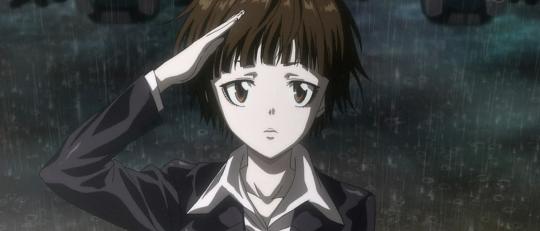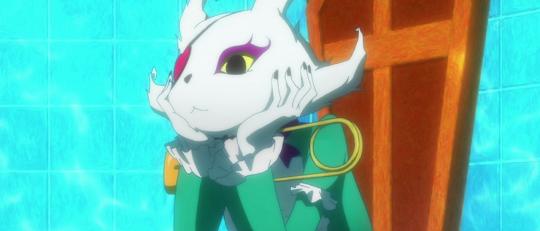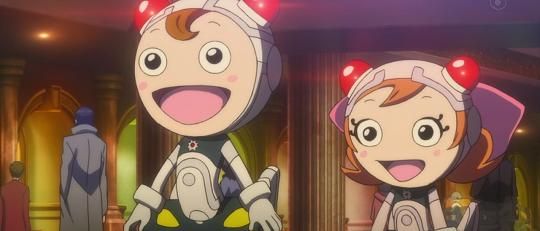It's a heretical sentiment to anyone, British or no, who grew up with Dredd as a comic book icon. Comparing Psycho-Pass' protagonist - a timid girl fresh out of the academy - to a Dirty Harry homage that was progressively retrofitted with philosophies from Thatcher's Britian, Fascism and the Cold War seems tortured at best.
It's an outlandish proposition and raises the questions of whether the series even has ulterior meanings or themes? No one would expect Queen's Blade or Busou Shinki for instance to be anything more than multifarious titillation rather than an exploration of women's rights. Psycho-Pass is already in good company, joining Production I.G.'s growing pantheon of smart sci-fi series which came to glorious fruition with Ghost in the Shell: Standalone Complex and was followed by the underrated Real Drive and divisive Eden of the East - to say nothing of I.G.'s earlier works with Patlabor. Pair the studio's willingness for smart productions with writer Gen Urobuchi, best known for his hand in Madoka Magica - which many would claim irrevocably subverted the magical girl genre - as well as earlier visual novel works, including the similarly pitched Kikokugai which is set in a "dystopian" future China. Pedigree then, but substance?
Big Brother as far as Psycho-Pass is concerned is here and it is the nameless system which has scanners on every street corner and is embedded in every apartment. It regulates dietary intake, mental health, it chooses your career for you, it's supposed to make sure everyone is mentally happy. Sometimes though, people break and the combat drones aren't able to coerce a person into therapy, that's when the Inspectors from the Public Safety Bureau become involved. Governed by the system, they utilise Dominators, a weapon used to subdue or kill criminals with a high enough Crime Coefficient.
What Psycho-Pass says about the current Japanese police force is rooted in its history. Forgoing a tiresome history lesson, the post-WW2 American occupation introduced a decentralised police force that would eventually become the current NPA and prefectural forces, championed by the trend setting Tokyo Metropolitan Police. Before WW2 however the police - both military and civilian - were immensely powerful, no more so than the civilian Tokkou, or Tokubetsu Koutou Keisatsu (Special Higher Police) who were tasked with controlling political movements and ideologies which were deemed to be antithetical to the ruling government. In short, they were the real-life thought police of George Orwell's 1984, spearheading legislation like the Peace Preservation Law which gave the government means and opportunity to eradicate burgeoning movements like Communism or just plain political dissent by arresting deviants and subjecting them to "re-education".
Clear parallels then with Psycho-Pass' Inspectors but what it says about the current situation is more subtle. Take for instance Akane and Nobuchika, both of whom are highly educated and with a strong sense of justice and could be thought of as models for the system of hue-checks and constant mental health assessments. Their only job however is to coral the Enforcers, who by the same system are considered criminal, leaving the two higher-ranks unable or incapable of fathoming these bizarre crimes. Compare this with the incidents such as the murder of Lucie Blackman or the recent arrest of Aum Shinrikyo cult member Katsuya Takahashi. Both cases have been criticised for the police's inflexibility and ineptitude when dealing with the unusualness of the case - their standard approach of coaxing confessions or local knowledge falling flat.
Or compare Psycho-Pass' second case set in the dark zone of the robotics factory, without their connection to the omnipresent system, both Inspectors and Enforcers are powerless. The Dominator guns (which bear similarity to a Judge's Lawgiver in more than just evocative naming), their only method of dispatching justice, rendered less useful than a truncheon or a notebook. Whether an attack on the pervasiveness of mobile phones and the internet in police doing their jobs or on the impotence of the Inspectors without the system guiding them is up for debate.
Perhaps most telling though is the Crime Coefficient, the number produced by the system that boils down profiling, history and emotions into a single, infallible set of digits. Whatever the system is, it has absolved its thralls of nearly all responsibility and left them only the most trivial of decisions - choice of clothes, diet, recreational activities. There is no justice system or due process in Psycho-Pass because the system, that Crime Coefficient, is considered absolute. Inspectors then are nothing but glorified trigger fingers, boiling down their possible responses to "criminals" to stun for re-education or kill.
The crime itself doesn't matter, only the number does. Japan's policing is similarly numerically afflicted and equally criticised for its adherence to goals and targets rather than measurably actually combating crime. Drug dealers arrested, brothels raided, organised crime members shaken down; all valid metrics but constant year on year. Inspectors are never shown integrating with the community or proactively preventing crimes - that's for the system and its hue checks now - only reacting to crimes that occur. It's even down to the Enforcers - pariahs and outliers, anomalies and creatives - to solve the cases leaving the Inspectors as glorified middle-managers.
Psycho-Pass then is a considered complaint about a police system which is perceived to be creating smart, well-adjusted members of society fit for directing traffic and helping old ladies but who are incapable of dealing with the vagaries of crime. A system which punishes those who step outside the confines of goals and criteria. Like the conflict at the core of Judge Dredd and at the heart of many stories of the police and justice is the chilling paradox that Akane in Psycho-Pass faces: she may have a strong sense of justice and disagree with the system enough to try to change it from within but by being part of it, she simultaneously supports it.
Many of Dredd's stories were borne out of a Britain deep in strife and coming to terms with the rise of the anarchist punk movement - where does the individual stand versus society, versus the establishment? Japan's answer to Dredd is informed by a country entrenched even now with the caste system and covered with a malaise of a society without accountability. Both are bleak outlooks extrapolated into the future as a "what if?" and both feature protagonists who, it could be argued, best represent their country's ideals. Akane just doesn't have stubble or astute one-liners.


